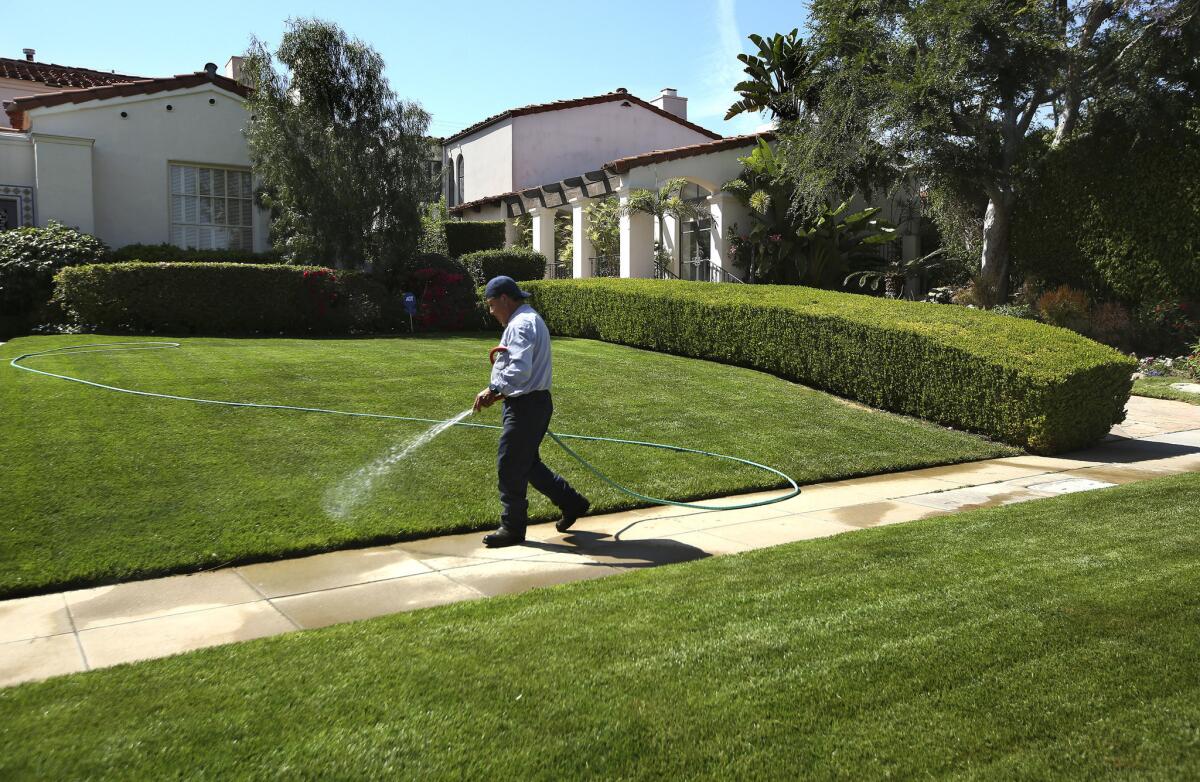State attorney general challenges ruling against tiered water rates

A gardener waters the front lawn of a home in Beverly Hills.
- Share via
The California attorney general’s office has asked the state Supreme Court to depublish a controversial ruling that it argues will impede the state’s ability to encourage conservation by charging people higher rates when they use excessive amounts of water.
In a seven-page letter filed late last week, the attorney general’s office, arguing for the State Water Resources Control Board, said an April decision by the 4th District Court of Appeal contains “unnecessary and overbroad language” that could hamper the state’s efforts to fight water waste amid the ongoing drought.
“The opinion’s faulty reasoning and unsupported dicta are likely to create confusion and uncertainty in this important area of law,” wrote Deputy Atty. Gen. William Jenkins.
In a lawsuit challenging a tiered water-rate structure once used in the city of San Juan Capistrano, the appellate court found that the system was unconstitutional because it charged more for water than it cost the city to provide the service.
The court said the city’s policy — which penalized water guzzlers with higher rates — did not base the fees on the actual cost of providing water to customers, as required under Proposition 218.
In May, the San Juan Capistrano City Council announced a settlement in the lawsuit, which was filed by the Capistrano Taxpayers Assn.
Benjamin T. Benumof, a lawyer who represents the taxpayer group, said the court got it right in the April ruling, and he called the attorney general’s letter “misplaced and unsubstantiated.”
“The decision of the Attorney General to seek depublication is clearly political,” said Jim Reardon, a member of the Capistrano Taxpayers Assn. “Sacramento politicians cynically seek to use the drought to impose new regulations and confiscate resources that properly belong to the people of the state.”
At least two-thirds of California water agencies use some type of tiered-rate structure, which officials say has been an effective tool for encouraging customers to use less water. The remaining agencies use a flat-rate structure based on the units of water consumed.
The Supreme Court can either order the opinion depublished or deny the attorney general’s request, said Kelly Salt, a Proposition 218 expert based in San Diego who wrote an amicus brief defending the city of San Juan Capistrano.
Depublication does not change the outcome of the case, but it would significantly reduce the decision’s impact statewide. If a decision is depublished, it cannot be cited as authoritative in any other trial court or appellate court decisions, Salt said.
Depublication is uncommon, said Michael A.M. Lauffer, chief counsel to the State Water Resources Control Board, adding that he expected the court to act on the request within two months.
Pressure to reduce water use with higher prices has intensified since April 1, when Gov. Jerry Brown issued an executive order requiring urban communities to cut their use by 25% over the next year. He also called on water agencies to employ rate structures that encourage conservation.
In a statement released in April, Brown said, “The practical effect of the court’s decision is to put a straitjacket on local government at a time when maximum flexibility is needed.”
Twitter: @ByMattStevens
More to Read
Sign up for Essential California
The most important California stories and recommendations in your inbox every morning.
You may occasionally receive promotional content from the Los Angeles Times.










